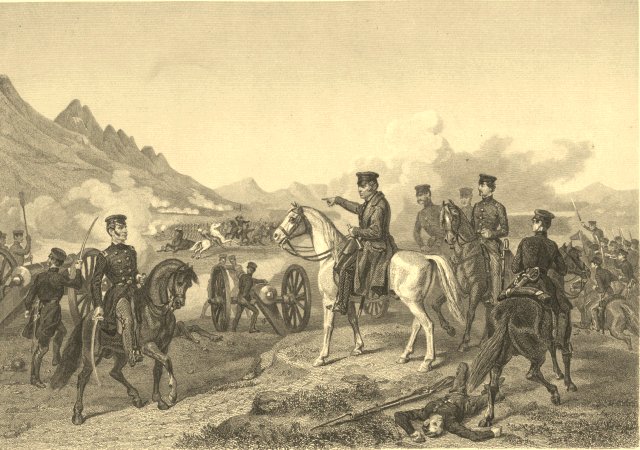On February 2, 1848, Nicholas Trist and Luis G. Cuevas signed the Treaty of Guadalupe Hidalgo, bringing the Mexican-American War to a close. The effects of the Mexican-American War were extensive. The balance of power in North America dramatically shifted, putting America and Mexico on track to becoming the countries they are today.

The Mexican-American War
The war began in 1846 after Mexican forces attacked a small American detachment in disputed land near the Rio Grande River. In response, President Polk requested that Congress declare war on Mexico.
America’s bigger, more organized armies rolled over Mexican forces capturing Mexico City on August of 1847. The final battle occurred at Huamalita on October 9, 1847, when America defeated the famed Mexican general Santa Anna. At this point, the United States occupied the majority of Northern Mexico, forcing the Mexican government to sue for peace.
Changing Borders
The most profound effect of the Mexican-American war was the changes to the Mexican and United States borders. Before Texas seceded, Mexico was 1,700,000 square miles. After the war, and the Gadsden Purchase 5 years later, Mexico was less than half the size it was only years before. The Treaty of Guadalupe Hidalgo rewarded the United States, Nevada, Utah, New Mexico, Arizona, Colorado, as well as parts of Wyoming, Texas, Oklahoma, and Kansas in exchange for $15 million. This sum was half what the United States offered to buy the land only a few years before.
The area annexed makes up around one-third of America today, though at the time few people were living on the land. About 75,000 Mexicans and the Apache, Pima, Navajo, and many other tribes lived on this land. The Treaty Of Guadalupe Hidalgo promised them US citizenship. Instead, the US stripped their rights and relegated them to second class citizenship. The tribes in the southwest waited almost 100 years before they received citizenship.
Effects On American Politics From 1848 – 1860
President Polk and the Democratic party were pro-war. The Whig party was not. Abraham Lincoln was one prominent voice of opposition to the war. In December 1847, he introduced Spot Resolutions to the house of representatives. The resolutions demanded that President Polk notify Congress of the exact location Mexico initially spilled American blood. The reception was lukewarm, even among Whigs, who eventually came around to the war. In 1848, they also nominated war hero Zachary Taylor to the presidency.
When war broke out in 1846, David Wilmot proposed to outlaw slavery in territory acquired from the war in the Wilmot Proviso. It passed the house of representatives twice, failing in the Senate both times. When the war ended, the question of slavery remained unanswered. Senator Henry Clay, the 1844 presidential nominee, proposed a compromise. California would be a free state, the Fugitive Slave Act gave southerners legal channels to reclaim runaway slaves, and news states in the Mexican territory would decide the status of slavery.
The failure to satisfactorily answer the question of slavery, left slavery in new states in Louisiana Purchase up in the air. Senator Stephen Douglas introduced the Kansas-Nebraska Act of 1854. The act repealed the Missouri Compromise and set up Kansas and Nebraska as states. Settlers in both states were to decide the question themselves. Nobody foresaw the lengths people would go to abolish or uphold slavery.
Thousands of settlers flooded into Kansas from abolitionist and pro-slavery camps. As a result, “Bleeding Kansas,” a statewide civil war erupted. Over the next five years, over one hundred would die in the conflict.
Abraham Lincoln’s election in 1860 was the final straw for the pro-slavery faction in the South. Worried that he would put an end to slavery’s westward expansion, ending the tenuous balance of power in the Senate, by March 1861, seven slave states declared that they were leaving the union.
Manifest Destiny
After the Louisiana Purchase, millions of Americans began to migrate west. American’s vast frontier offered settlers the possibility of upward mobility. John O’Sullivan first referred to this phenomenon as Manifest Destiny, unlike Europe. It was America’s destiny to carry its freedom to the edge of the continent. One of the most lasting effects of the Mexican-American War was to legitimize this idea in the minds of many.
Effects of The Mexican-American War On The Civil War
The Mexican-American war was a training ground for many Civil War leaders. Robert E. Lee, Stonewall Jackson, and Ulysses S. Grant were some of many who experienced combat during the war.
Innovative tactics and strategies learned in Mexico unfolded in the Civil War. Effective leaders allowed the South to fight back when it should have crumbled. By the end of the war, 600,000 Americans were dead and wounded. Some thought the Civil War was an act of God, punishing America, for its sins. President Ulysses S. Grant held this belief, writing about it in his 1885 memoirs.
Effects on Mexico After The War
Losing the war was catastrophic for Mexico. The tragic loss of life, coupled with America occupying most of the country, was humiliating. Guadalupe Hidalgo only made this worse, shattering the nation’s dignity. It is only natural for many Mexicans to resent the United States to this day.
The war also exacerbated the instability that already plagued the Mexican government. Before 1857, 50 governments ruled Mexico ranging from dictatorships to republics. In 1857 this culminated into a civil war known as The War of Reform. Liberals and Conservatives fought for three years until the Liberals victory in 1860.
- Tulip Mania – The Story of One of History’s Worst Financial Bubbles - May 15, 2022
- The True Story of Rapunzel - February 22, 2022
- The Blue Fugates: A Kentucky Family Born with Blue Skin - August 17, 2021

Howdy! I’m at work surfing around your blog from my new iphone!
Just wanted to say I love reading your blog and look forward to all your posts!
Carry on the fantastic work!